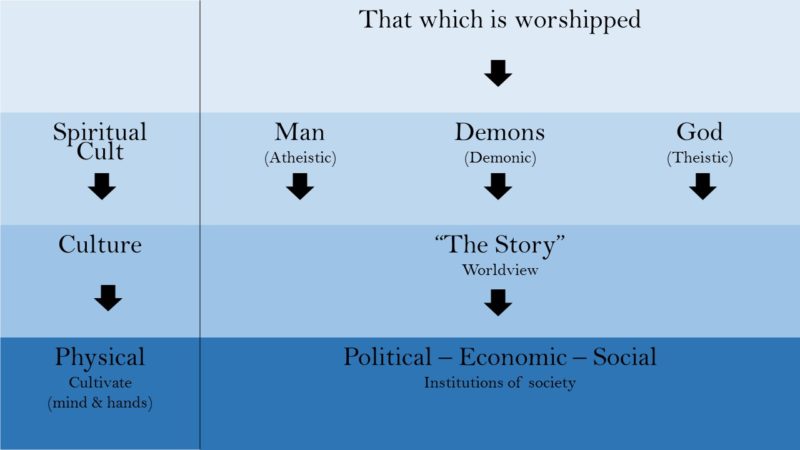Politics has been dominating the news for a long time here in the US. And certainly politics has its place in God’s order. But politics is not the foundation of any nation. A society’s public life and institutions—including politics—are a reflection of its cultural values.
Many people never stop to recognize that politics is downstream from culture. What we see in our politics is the natural fruit of the culture. Culture is the daily working out of our worship – cult.
In an animistic society, for example, spirits are believed to inhabit everything, and worship is made by sacrifices. An offering is presented: a bowl of rice at the base of a tree, or incense at a shrine with a picture of the worshiper’s grandfather. The worshiper burns the incense in hopes that her grandfather’s spirit will either look out for her or at least leave her alone.
This worship (cult) finds its way into the institutions of the society. If you need something from a government official, you approach him with gifts (read bribes). You give him an offering to do something favorable for you, or to leave you alone.
 Note the graphic. At the left, we see the general principle that the spiritual dimension of human life flows into the culture. Culture is comprised of the activities of minds and hearts, and all of that is a reflection of the spiritual. The rest of the graphic shows three alternative systems in which this plays out. Where atheism is embraced, we are seeing the worship of man. Demonic cultures venerate demons. Theistic societies worship God. Each of these develops a story or explanation of life, a worldview. That worldview shapes the politics, the economics, and the social institutions.
Note the graphic. At the left, we see the general principle that the spiritual dimension of human life flows into the culture. Culture is comprised of the activities of minds and hearts, and all of that is a reflection of the spiritual. The rest of the graphic shows three alternative systems in which this plays out. Where atheism is embraced, we are seeing the worship of man. Demonic cultures venerate demons. Theistic societies worship God. Each of these develops a story or explanation of life, a worldview. That worldview shapes the politics, the economics, and the social institutions.
Moral and spiritual development is foundational to national development. This is true both at the level of personal righteousness and public righteousness. To pretend that our social mores, or economic practices, or politics can be separated from our spiritual moorings is folly. Every human, and every human society, has some kind of spiritual foundation. Everything else in life is built on that foundation.
If the foundation is God’s order, the result is life. God the Creator built life into the creation principles. His order is life giving. Wisdom is the practice of God’s order.
English writer and Christian apologist G.K. Chesterton wrote in the early part of the 20th century,
If anyone wishes to know what we mean when we say that Christendom[1] was and is one culture, or one civilization, there is a rough but plain way of putting it. It is by asking what is the most common … of all the uses of the word ‘Christian” … It has long had one meaning in casual speech among common people, and it means a culture or a civilization.[2]
Christendom is the Bible taken into the world, not limited to the church. It is Christianity affecting everyday actions, a culture of doing good in a beautiful way that reveals truth.
One indicator of a society marked by biblical principles is the virtuous life of its citizens. The practice of a limited set of virtues—perhaps two dozen—leads to the flourishing of individuals and societies.
But each virtue has its corresponding vice that leads to poverty in individuals and societies. Virtues and vices are both inward and outward. They begin in the heart and go out to the sectors.
 For example, consider marriage. From creation, marriage has been monogamous and heterosexual. In such a context sexual expression is blessed and humans thrive. Marriage as God invented it comprises the virtuous practice of human sexuality. Any other expression of sexual intimacy is a vice. Sexual practice without regard to its virtuous design leads to destruction. This is true for the individual and for the society.
For example, consider marriage. From creation, marriage has been monogamous and heterosexual. In such a context sexual expression is blessed and humans thrive. Marriage as God invented it comprises the virtuous practice of human sexuality. Any other expression of sexual intimacy is a vice. Sexual practice without regard to its virtuous design leads to destruction. This is true for the individual and for the society.
Webster’s 1828 dictionary defines virtue as “Moral goodness; the practice of moral duties and the abstaining from vice, or a conformity of life and conversation to the moral law.”
Put simply, virtue is voluntary obedience to truth.
Here’s how the same lexicographer defines vice: “In ethics, any voluntary action or course of conduct which deviates from the rules of moral rectitude … any moral unfitness of conduct, either from defect of duty, or from the transgression of known principles of rectitude … the excessive indulgence of passions and appetites which in themselves are innocent, is a vice.”
Our fallen human nature gravitates naturally to vice. Virtues are rooted in love; they require intentional development. This is the message of Proverbs regarding the nurture and discipline of children.
The development of virtues in four arenas of life is essential: 1) moral and spiritual life, 2) social life, 3) political life, and 4) economic life. Each of these represents a vital aspect of public life which will flourish only as a corresponding set of virtues is practiced.
In politics, yes, and in all of life.
from a forthcoming book
[1] In the past, the word “Christendom” was used in European/American societies grounded in biblical principles.
[2] G.K. Chesterton, A Short History of England







2 Comments
Jon
January 28, 2017 - 3:29 amEncouraging as always. 🙂
admin
January 30, 2017 - 10:42 amGood. Thanks, Jon.
Gary Brumbelow